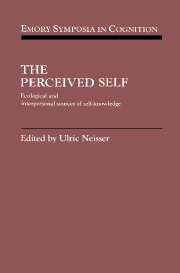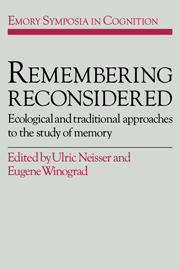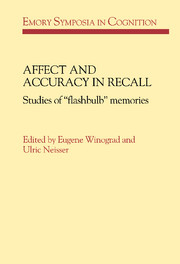4 results in Emory Symposia in Cognition
The Remembering Self
- Construction and Accuracy in the Self-Narrative
-
- Published online:
- 04 August 2010
- Print publication:
- 28 October 1994

The Perceived Self
- Ecological and Interpersonal Sources of Self Knowledge
-
- Published online:
- 29 March 2010
- Print publication:
- 27 May 1994

Remembering Reconsidered
- Ecological and Traditional Approaches to the Study of Memory
-
- Published online:
- 25 March 2010
- Print publication:
- 24 June 1988

Affect and Accuracy in Recall
- Studies of 'Flashbulb' Memories
-
- Published online:
- 22 March 2010
- Print publication:
- 30 October 1992

